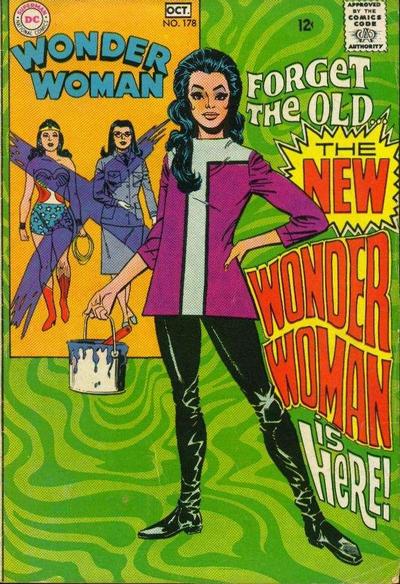In Her Satin Tights, Fighting For Her Rights
So, Adrianne Palicki (Friday Night Lights) has been cast in NBC’s Wonder Woman pilot, putting us in an awkward position. Palicki is good casting: not only tall and attractive enough, but also someone who has proven that she can act, on a critically-beloved show yet. It’s hard not to root for such a project, whether you’re an FNL fan, a comics fan or a fan of Palicki in the costume. And then there’s the fact that the show itself is still, last we heard, working from a truly absurd script by David E. Kelley. How can anyone root for that, no matter how good the star is?
Share
 So, Adrianne Palicki (Friday Night Lights) has been cast in NBC’s Wonder Woman pilot, putting us in an awkward position. Palicki is good casting: not only tall and attractive enough, but also someone who has proven that she can act, on a critically-beloved show yet. It’s hard not to root for such a project, whether you’re an FNL fan, a comics fan or a fan of Palicki in the costume. And then there’s the fact that the show itself is still, last we heard, working from a truly absurd script by David E. Kelley. How can anyone root for that, no matter how good the star is?
So, Adrianne Palicki (Friday Night Lights) has been cast in NBC’s Wonder Woman pilot, putting us in an awkward position. Palicki is good casting: not only tall and attractive enough, but also someone who has proven that she can act, on a critically-beloved show yet. It’s hard not to root for such a project, whether you’re an FNL fan, a comics fan or a fan of Palicki in the costume. And then there’s the fact that the show itself is still, last we heard, working from a truly absurd script by David E. Kelley. How can anyone root for that, no matter how good the star is?
Now, there’s no guarantee that if the show makes it to air it’ll still be using that script, or even that producer. Kelley was also hired to write and produce the U.S. remake of Life On Mars and was fired before the show aired. How much this show changes before it airs (if it does) depends on what NBC’s new boss, Robert Greenblatt, wants from the project — which was turned down by everybody before he decided to pick it up at the last minute. Does he want Kelley’s idea of Wonder Woman? Or does Greenblatt just want a Wonder Woman show, because it’s one of the most venerable combinations of guy appeal with girl power? The answer to that question may determine how much the show gets retooled from Kelley’s script.
Wonder Woman is a tough property to adapt, anyway. Maybe she shouldn’t be — on paper she hardly seems more problematic for adaptation than Superman, who is even more ridiculously invincible and requires more complicated special effects — but she is. Joss Whedon’s attempt to do a Wonder Woman feature fell apart, and she’s been absent from the superhero movie revival of the last few years. Warner Brothers could never launch a Wonder Woman animated series to go with their Batman and Superman ones, though the idea was in the planning stages a couple of times. The Lynda Carter version is probably the most successful, and it only made it to air after a completely different pilot (starring Cathy Lee Crosby) was rejected by the network.
Why Wonder Woman is so hard to adapt successfully, I can’t quite say, but I think there’s something about her that doesn’t quite mesh well with the modern era, whatever “modern” happens to be. The best-liked version is the one from the first season of the Carter series, which simply dropped the idea of trying to modernize her and set the show in the time when she was created, the 1940s. Her innocence and occasional cluelessness somehow worked better in a period-piece context, and the need for her to maintain a secret identity — a secret identity non-threatening to men — became clearer. Once they retooled it for CBS and set it in the ’70s, the point of the character seemed lost.
Then you have the various attempts to make her relevant, which usually turn out horribly. My favourite example is how in the late ’60s, DC decided the way to make her appealing to a groovy, hip audience was to have her give up the super powers and the costume, dress in mod fashions, take on a magical Chinese mentor, and fight crime in go-go miniskirts or Emma Peel pantsuits. The decision to strip her of her powers just as women in real life were starting to become more empowered was a famously boneheaded move, the subject of a famous campaign by Gloria Steinem to bring back the powerful Wonder Woman who had inspired little girls. (Yes, the original Wonder Woman also got captured and tied up a lot, but so did the de-powered version.) The TV series’ decision to go back to the original time period may have been a way of throwing up hands, saying that there’s just no way to put this character into a contemporary setting. We’ll see what happens when/if this version finally hits the airwaves. The choice of costume, if nothing else, will be interesting, since there are several different versions to choose from and each choice says something different about the approach to the character — how contemporary she’s supposed to be, how much of a sex object she is, and so on.
Again, I don’t think she’s any more of a problem in this regard than Superman is, except for the costume issues. But writers, particularly writers of adaptations, do seem to have tremendous trouble with her. That’s how you get crazy stuff like the Kelley script.